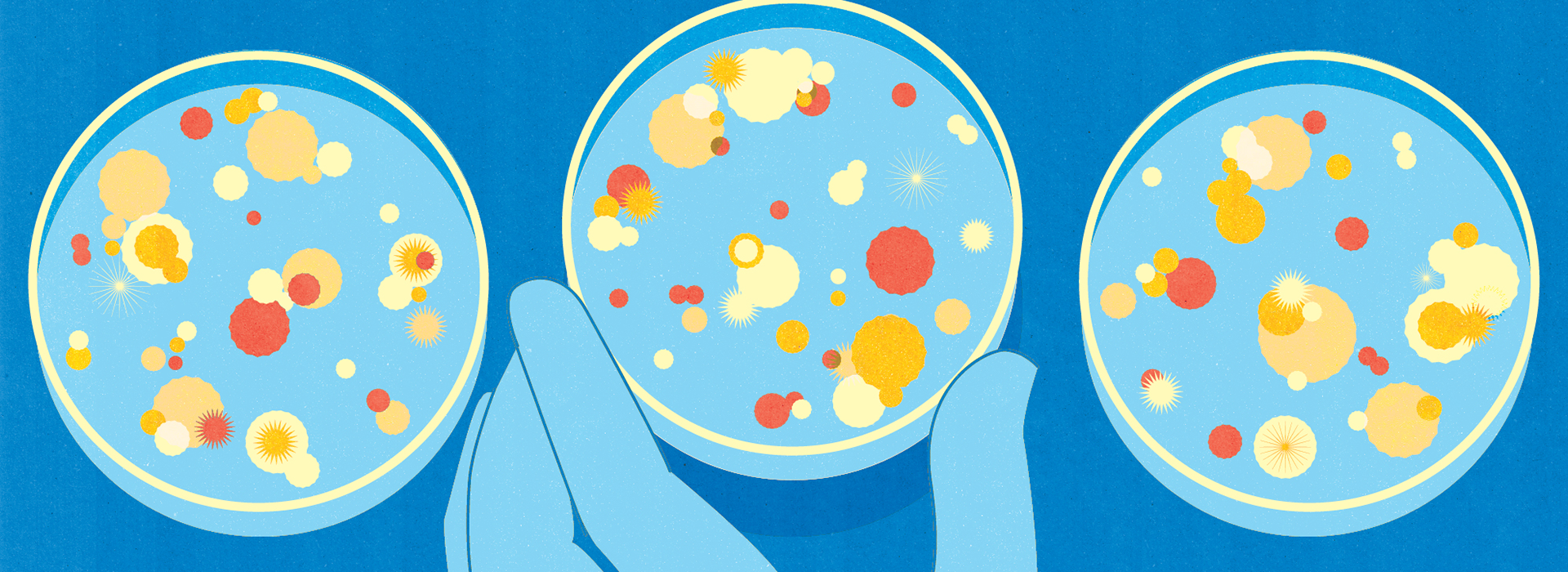By: Cynthia Macdonald
4 Mar, 2019

The word “microbe” often calls to mind thoughts of dirt, infection and disease. But microbiologist B. Brett Finlay is determined to change this one-sided view.

Finlay, co-director of CIFAR’s Humans & the Microbiome program, has co-written a new book about our physical relationship to germs. In The Whole-Body Microbiome, he and his daughter Jessica Finlay, a gerontologist, argue that while certain microbes can indeed hurt us, our collective zeal for cleanliness has only produced a new spate of equally damaging problems.
Conducting a fantastic voyage through the body’s most microbially complex spaces, the Finlays insist that people can lead healthier, longer lives by gaining a more nuanced understanding of the trillions of tiny bugs that live atop and within us. B. Brett Finlay recently discussed his book from his office at the University of British Columbia.
One of the more startling revelations you make is that microbes are linked to nine of Western society’s top 10 causes of death.
Pneumonia is the only one that’s obviously microbial. But heart attacks and strokes have a microbial component too: when you eat red meat, gut microbes digest it into compounds that ultimately cause atherosclerosis. It’s also been shown that brushing your teeth and following the MIND (Mediterranean-DASH Intervention for Neurogenerative Delay) diet can decrease dementia by 50 per cent. In the chapter on cancer we talk about the role microbes play there, especially with respect to immune checkpoint inhibitor therapy. And so it just goes on and on; I agree it’s a bold statement but it’s true! Five years ago we had no idea about this.
Your last book was called Let Them Eat Dirt, and it looked at the positive side of germs. But you still advocate tooth-brushing and hand-washing.
It really is a question of balance. Brushing teeth prevents microbes from seeping into your body, so they don’t trigger low-grade inflammation that causes tissue damage and disease. So yes, that’s the “bugs are bad” concept. But then other microbes can actually have an anti-inflammatory effect. I think the key take-home message is yes, avoid infectious things – if it’s flu season, wash your hands. But you need microbes, too. You should be petting your dog and playing on the rug with your grandkids, because a lot of studies show you need this healthy microbial exposure.
We are absolutely slathered in germs: as you write, there are more microbes on our hand than there are people on earth. How do we know which are good for us and which are bad?
There are only about 100 microbial species that cause disease in humans. So the question is, what are the good bugs? That’s something we’re now learning, and what we’re discovering is that there are an awful lot of them. But no single one is going to cure everything; it’s these complex, diverse microbial communities that are so necessary for general health. The ecosystem analogy is a good one – we know that species diversity is essential to the health of the Amazon region, and really, the microbiome is just another ecosystem.
Recently, we’ve started to hear about new medical procedures such as fecal transfers, which may seem strange to some patients but exciting to others. Is the medical community completely on board with this new view of microbes?
This is very interesting because the public has embraced it far more rapidly than the medical profession. Doctors are slowly coming around but you have to understand, their first mantra is do no harm. And if someone walks in and says I want a fecal transfer because I want to lose weight, there might be some harm associated with that.
It takes at least a decade for clinical trials to produce evidence, and this field is barely 10 years old. But it’s coming: we’ve already seen that a fecal transfer is the best medical cure for an infection with the bacterium C. difficile. In the future, instead of these transfers, we’ll likely see a more refined approach where people are given ten to twenty specific microbes that were grown in clean labs.
Dietary probiotics is huge industry now. What do you make of this trend?
Right now, we know that some probiotics definitely work for some things, like certain gastrointestinal problems. But the analogy I like to use is, say you want to buy running shoes. You don’t just pull any pair off the shelf, because it’s not one size fits all. And that’s where probiotics are right now. If you have a particular infection you take a particular antibiotic: that’s where we need to get to with dietary probiotics.
For a list of probiotics that have been shown in clinical trials to work for specific diseases, see www.probioticchart.ca